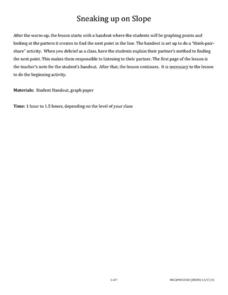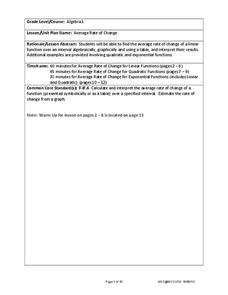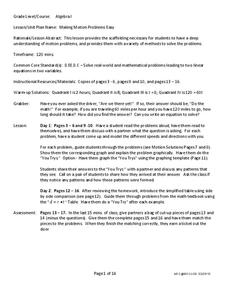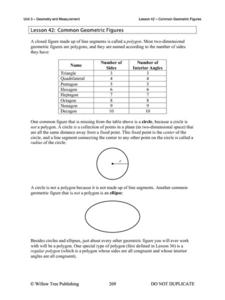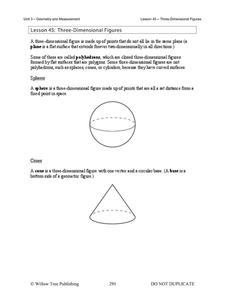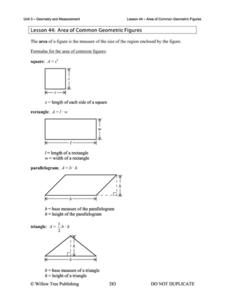C-SPAN
Polling and Public Opinion
Most people are eager to offer their opinions about topics of interest, but what's the most effective way to collect and assess these opinions as a matter of fact? High schoolers learn about the history of polling, as well as the...
Civil War
Civil War Medicine: Fact or Fiction
Young historians compare the presentation of medical care during the Civil War in passages from fictional and nonfictional texts. They examine passages from Gone with the Wind by Margaret Mitchell and Soldier's...
West Contra Costa Unified School District
Shifting Linear Equations in Function Notation
Time for a shift in thinking! Learners examine translations of linear functions. They use function notation to describe the translation and make connections to the graph.
West Contra Costa Unified School District
Multiplying Binomials and Factoring Trinomials
Two lessons for the price of one! Learners use algebra tiles to multiply binomials in the first lesson, Next, they use their knowledge from the first lesson to factor trinomials into two binomials.
West Contra Costa Unified School District
Connecting Arithmetic Sequences to Linear Equations
Common difference is to arithmetic sequences as what is to linear equations? (Answer: slope) Pupils learn how arithmetic sequences can be considered as linear patterns. They then write linear equations to represent arithmetic...
West Contra Costa Unified School District
Talking About Distance, Rate and Time
Connect the tortoise and the hare fable to mathematics. Learners first identify key terms related to distance, rate, and time. They then solve distance/rate/time problems using different representations.
West Contra Costa Unified School District
Sneaking Up on Slope
Pupils determine the pattern in collinear points in order to determine the next point in a sequence. Using the definition of slope, they practice using the slope formula, and finish the activity with three different ways to...
West Contra Costa Unified School District
Using Bar Models to Solve Rate Problems
Pupils visualize distance-rate-time problems by using bar models. The instructional activity presents examples of four different types of rate problems and shows how they can be solved using bar models and equations. Each...
West Contra Costa Unified School District
Average Rate of Change
Learners investigate average rates of change for linear functions and connect the concept to slope. They then determine average rates of change in quadratic and exponential functions.
West Contra Costa Unified School District
Motion Problems
Let's hope class participants don't get motion sickness. In the lesson, class members first solve motion problems using tables and graphs. They then use algebraic techniques to solve motion problems.
West Contra Costa Unified School District
Connecting Fractions and Rational Expressions
Teach class members to work with rational expressions using their knowledge of fractions. The lesson plan starts with a warm-up of rational expressions at four different levels of complexity. The different levels continue throughout...
Willow Tree
Common Geometric Figures
Geometry could be called the study of figures. An overview of the figures found in a typical geometry course contains a study of different triangles, quadrilaterals, and regular polygons.
Willow Tree
Angle Sum Property of Triangles
All triangles have some things in common. Using these properties of triangles, learners find missing angle measures. Scholars use the Angle Sum Property and properties of special triangles throughout the lesson.
Willow Tree
Surface Area of Three-Dimensional Figures
Lateral area and surface area are simple concepts, but calculating them is not as easy! Using formulas, learners calculate lateral area and surface area for the same three-dimensional figures. The resource discusses the formula variables...
Willow Tree
Three-Dimensional Figures
Time to move into the third dimension! Learn the names of the geometric solids and count faces, edges, and vertices. Then learn to recognize nets that create a given solid.
Willow Tree
Area of Common Geometric Figures
Scholars can use area formulas, but can they apply what they know about area? The activity challenges learners to think logically while practicing finding area of shapes such as rectangles, circles, parallelograms, triangles, and other...
Willow Tree
Perimeter of Common Geometric Figures
Help learners understand that perimeter and circumference are one in the same. Learners apply their skills to determine the perimeter/circumference of triangles, rectangles, and circles. They then use the same strategy to find the...
Willow Tree
Dimensional Analysis
Convey to your pupils the importance of units, then show how to use dimensional analysis to perform a unit conversion. The math lesson includes detailed worked-out solutions to guide learners in their practice.
Willow Tree
Measurement
Build a basic understanding of units of measure and create a great foundation for your learners. The lesson plan gives a complete overview of everything measurement, from types of measurement to rounding to conversions — it has it...
Willow Tree
Transformations
How does something go from here to there? Describe it with a transformation. Young mathematicians learn how to translate, reflect, rotate, and dilate an image.
Willow Tree
Ratios and Proportions with Congruent and Similar Polygons
Investigate how similar and congruent figures compare. Learners understand congruent figures have congruent sides and angles, but similar figures only have congruent angles — their sides are proportional. After learning the...
Willow Tree
Midpoint and Distance Formulas
The shortest distance between two points is a straight line. Learners use the Pythagorean Theorem to develop a formula to find that distance. They then find the midpoint using an average formula.
Willow Tree
Interior Angles, Exterior Angles, and Diagonals of Polygons
How does the number of sides of a polygon affect the angle measures? Learners recognize a pattern in finding the total measure of interior and exterior angles and the number of diagonals. They use the patterns to calculate...
Willow Tree
The Pythagorean Theorem
There isn't a more popular geometry formula than the Pythagorean Theorem! Learners understand the special side relationships in a right triangle. They use the Pythagorean Theorem to find missing sides and to solve problems. They begin...






